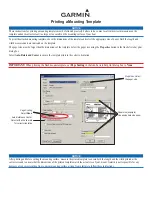
Model 865-A Deep Sea Acoustic Release/Transponder
M-855-009
Benthos, Inc.
16
NOTE
: In some extreme cases, ship noise may prevent the deck unit from receiving replies from the
865-A. Try to reduce the background noise by shutting down unnecessary equipment, especially
propulsion. If there is still no response, do not panic! Most likely, the 865-A is hearing the deck unit
fine, but the noise at the surface is too great to hear the 865-A. Go ahead and send the RELEASE
command and as the release approaches the surface, you will probably be able to range on it. Also,
remember that the 865-A will automatically ENABLE itself when the release occurs, even if you were
not able to successfully command it to ENABLE.
Normally, when the ship is in position and consistent slant ranges are being achieved, then the
RELEASE command may be transmitted. If successful, the release will automatically transmit a four-
ping burst which will be seen or heard by watching the receive LED or listening on the head phones of
the deck unit. The ascent may be tracked by sending single transponds from the deck unit. Now the
release will reply with five pings. An accurate slant-range will be displayed and the blink of the reply
LED will indicate that the unit has released. The five-ping acknowledgment may also be clearly heard in
the headphones. The 865-A will continue replying with five pings when interrogated until it is turned
OFF.
Watch for the surfacing floats and recover the package.
Once on deck, turn the switch to HOLD-EXTEND (being careful not to jam the lever) and scrub the unit
off with fresh water.
If the release is going to be redeployed, follow the turnaround procedure in Section 7.1.
5.0
HARDWARE DESCRIPTION
5.1
Mechanical Parts
5.1.1
Housing
(Part No. C-855-19)
The housing consists of a 17-4 PH stainless steel tube with transducer guard, end cap, padeyes and
closure bolts welded on. All parts are also 17-4 PH stainless steel. The housing is painted and a 1018
carbon steel anode is attached between the padeyes for corrosion protection.
5.1.2
End Cap Assembly
(Part No. D-855-21)
This modular subassembly consists of the release end cap, motor and pin retraction mechanism (see
Drawing D-855-21).
For pin retraction or extension, an extremely high torque motor is used to rotate a screw. The pin is
attached to a low friction, ball-bearing nut which rides up and down the screw as the screw rotates, thus
causing the pin to extend or retract. By design, the water pressure exerts a force which actually aids in
the retraction, thus eliminating any fears of fouling or jamming.
Summary of Contents for 865-A
Page 2: ......
Page 4: ......
Page 10: ...Model 865 A Deep Sea Acoustic Release Transponder M 855 009 Benthos Inc 2 Figure 1 1 ...
Page 51: ...Model 865 A Deep Sea Acoustic Release Transponder M 855 009 Benthos Inc ...
Page 52: ...Model 865 A Deep Sea Acoustic Release Transponder M 855 009 Benthos Inc ...
Page 56: ...Model 865 A Deep Sea Acoustic Release Transponder M 855 009 Benthos Inc ...
Page 57: ...Model 865 A Deep Sea Acoustic Release Transponder M 855 009 Benthos Inc ...
Page 58: ...Model 865 A Deep Sea Acoustic Release Transponder M 855 009 Benthos Inc ...
Page 59: ...Model 865 A Deep Sea Acoustic Release Transponder M 855 009 Benthos Inc ...
Page 60: ...Model 865 A Deep Sea Acoustic Release Transponder M 855 009 Benthos Inc ...
Page 61: ...Model 865 A Deep Sea Acoustic Release Transponder M 855 009 Benthos Inc ...
Page 62: ...Model 865 A Deep Sea Acoustic Release Transponder M 855 009 Benthos Inc ...
Page 64: ...Model 865 A Deep Sea Acoustic Release Transponder M 855 009 Benthos Inc ...
Page 65: ...Model 865 A Deep Sea Acoustic Release Transponder M 855 009 Benthos Inc ...
Page 66: ...Model 865 A Deep Sea Acoustic Release Transponder M 855 009 Benthos Inc ...
Page 68: ...Model 865 A Deep Sea Acoustic Release Transponder M 855 009 Benthos Inc ...
















































